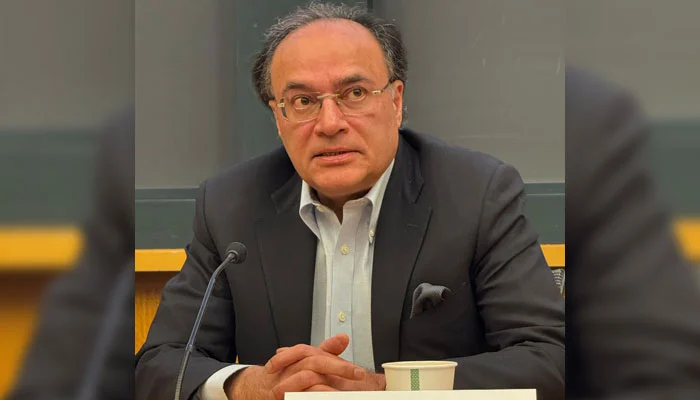Finance Minister Muhammad Aurangzeb, speaking at Harvard University in the United States, emphasized Pakistan’s economic turnaround and extended an invitation to investors to consider opportunities within the nation.
During his address at the “Bridging Divides, Building Tomorrow: Pakistan’s Path to Inclusive Growth and Governance” conference, Aurangzeb stated, “Having inherited an economy facing formidable challenges—from a contracting GDP to dwindling reserves—we have successfully stabilized the fundamental aspects, restored confidence, and reignited economic growth.”
The annual flagship event of the Pakistan Conference serves as a crucial platform for fostering collaborative solutions, promoting global engagement, and convening policymakers, academics, business leaders, and students to discuss Pakistan’s economic, political, and social trajectory.
In his remarks, the Finance Minister highlighted key achievements, including a historic reduction in inflation to 0.7%, the lowest in 60 years; a doubling of foreign exchange reserves; a 3% appreciation of the currency; and a current account surplus exceeding $1 billion in March 2025.
Pakistan has also reportedly witnessed a 44% increase in Foreign Direct Investment (FDI), a 24% growth in IT exports, and projected record-high remittances of $38 billion. (Please note that other sources indicate a significant decline in FDI in earlier months of the fiscal year. This point may require further verification.)
For the first time in 24 years, Pakistan achieved a fiscal surplus, alongside the highest primary fiscal surplus in two decades. Fitch has upgraded Pakistan’s sovereign credit rating to B- with a stable outlook.
Emphasizing that “stability is not an end in itself but a means to an end,” the Finance Minister outlined the government’s strategic priorities, including maintaining fiscal discipline, controlling inflation, and pursuing deep structural reforms in the energy sector, taxation system, governance framework, and the management of state-owned enterprises.
He underscored significant growth prospects in Pakistan’s abundant mineral resources, expanding IT sector, green energy initiatives, and the country’s youthful and entrepreneurial population. He stressed that strengthening human development is crucial for sustaining high and inclusive growth.
Regarding debt management, the Minister noted Pakistan’s success in reducing its public debt-to-GDP ratio from 75% to 67.2%, with a medium-term target of bringing it below 60% through prudent fiscal management, enhanced domestic financing, and tax reforms.
Efforts to right-size government expenditures and privatize loss-making state-owned enterprises are projected to yield annual savings of up to 2% of GDP, with a focus on transparency, competitive processes, and fostering investor confidence.
Discussing Pakistan’s financial sector, the Minister outlined plans to develop a deeper and more resilient system by expanding digital banking, capital markets, and green finance initiatives.
Highlighting the impact of climate change, the Minister reaffirmed Pakistan’s commitment to integrating resilience measures into infrastructure and agriculture. He specifically mentioned the Resilience and Sustainability Facility (RSF) from the International Monetary Fund (IMF) and the Country Partnership Programme (CPF) approved by the World Bank as key anchors for building climate resilience.
“Pakistan’s future will be defined by bold and necessary choices. By investing in our people, modernizing our economy, and remaining committed to reform, Pakistan will emerge stronger, greener, and more competitive,” the Finance Minister concluded.



